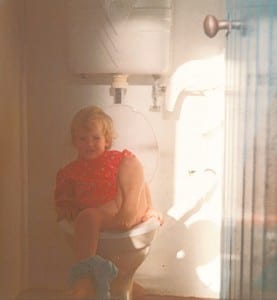Toilet stories
By ucessjb, on 3 September 2013
 Families are libraries of embarrassing stories. In my family embarrassing stories are catalogued by theme, as well as person. Embarrassing stories of my youngest sister usually involve overeating, notably of pickled foods. My theme is toilets, or ‘going to the toilet’. Like the time I heard the call of nature whilst climbing a big hill near a busy road with my siblings. From that height everything looked small, and I figured I was invisible to the drivers so far below. When I returned to the car park my grandmother informed me, and countless others in years to come, that I was not. Or my habit of keeping the door open to our semi-outhouse in the small village where I grew up, so I could keep an eye on the infrequent passers-by, mortifying my mother who was more concerned that the whole community could see me. These stories remind me that toilets and ‘going to the toilet’ are meant to be hidden, a lesson I have been very slow to learn.
Families are libraries of embarrassing stories. In my family embarrassing stories are catalogued by theme, as well as person. Embarrassing stories of my youngest sister usually involve overeating, notably of pickled foods. My theme is toilets, or ‘going to the toilet’. Like the time I heard the call of nature whilst climbing a big hill near a busy road with my siblings. From that height everything looked small, and I figured I was invisible to the drivers so far below. When I returned to the car park my grandmother informed me, and countless others in years to come, that I was not. Or my habit of keeping the door open to our semi-outhouse in the small village where I grew up, so I could keep an eye on the infrequent passers-by, mortifying my mother who was more concerned that the whole community could see me. These stories remind me that toilets and ‘going to the toilet’ are meant to be hidden, a lesson I have been very slow to learn.
There are no doubt very good evolutionary, sanitary, psychological and cultural reasons for hiding our toilets and going to the toilet in private. On the other hand, I like to think that outliers like me, who are slow on the uptake of toilet invisibility, serve some sort of social purpose.
We need to go public about toilets. We can no longer hide from the global sanitation crisis. Roughly two and a half billion people don’t have access to any form of improved sanitation. That means that more than one third of the world’s population don’t even have a pit latrine, never mind a flushing toilet. Water resources around the world are increasingly stressed and conventional sewerage infrastructure is expensive to build, maintain and operate.
The flushing toilet and water based sanitation systems that we take for granted in cities like London are unlikely to be replicated in the rapidly urbanising cities of the global south. There are many advantages to flush toilets and water based sewerage systems, but present and future shortages of money, water and nutrients indicate that their costs increasingly outweigh their benefits. It is time for a new model of sanitation, which is more affordable and sustainable.
There are many people around the world working to develop alternative sanitation technologies and systems, particularly to address the global sanitation crisis. The problem is that, by and large, these toilets remain less desirable than the flushing loo. The new model of sanitation needs to desirable.
And so once again I am making myself visible on the toilet. This time I am working with colleagues at UCL to curate a festival of technology and ideas about sanitation. Hosting a toilet festival in London might seem trite, given the scale of the crisis in the global south, and our contribution to solving those vast problems will be minuscule. But our proposition is that the sanitation crisis is truly global. We should all be horrified by the current global shortfall in access to sanitation, and it is wise to be prepared for resource shortages here. If London was the centre of the nineteenth century water based sanitary revolution, then it should also be part of the twenty-first century ecological sanitation revolution. If ecological sanitation is to be affordable, sustainable and desirable, then perhaps it will one day be the preferred option in London. This what we hope to contribute – to make toilets visible and to start a conversation about how we might make ecological sanitation the globally preferred option, not the only option for people who cannot afford any better.
Please donate to UCLoo Festival – just £5 or less will help – to make sure this conversation happens: http://spacehive.com/ucloofestival2013 But hurry – we must reach our fundraising target by 17th October!
 Close
Close

